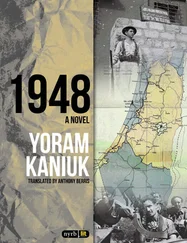Rebecca went into her room, locked the door, and for two days she didn't come out. When the great-grandson of Ahbed claimed that the corpse was rotting, she yelled at him not to come near her. Two days later, planes were heard passing over the house on their way north, and Rebecca went out of the room wearing a black dress and asked Ahbed to make her something to eat. She sat alone to eat and said: What great generals are starting to die now!
Nobody knew how to bury him. His splendid lying in bed evoked admiration and amazement mixed with an intoxicating atmosphere of victory. The rabbi waged a hard struggle not only with Rebecca but also with Mr. Klomin and a few other old men who began to show a suspicious fondness for the Captain. When Mr. Klomin went to the small church in Jaffa, there wasn't a single person alive who remembered the Captain. In the beautiful house among swans and rare birds where the old man dressed in white sank into the ground, lived three old Arabs. The rabbi who left before in high dudgeon now returned from Roots in an almost philosophical mood, a sense of death stuck to him too, but he still firmly refused to bury the Captain in Roots. Rebecca argued with an implacable vehemence that her husband had founded Roots even though of course he wasn't to blame for the stupid name they gave the cemetery, and she had, she claimed, the right of veto. The phrase "right of veto" she had heard on the radio in interpretations of H. Herzog about the war Boaz was fighting now to make Nehemiah's desired and dubious future present, she said.
Nor in the Captain's papers did they find anything to indicate how to bury him. The valises and crates said: "To Boaz Schneerson." Rebecca and Mr. Klomin searched in those closets and cases with Boaz's name. Mr. Klomin, who wore white in honor of the resurrected kingdom of Israel-but also his joy for the kingdom and his worry about the disgrace that would be brought down on it by the leaders of Israel who surely didn't understand the greatness of the hour-didn't cover his pain at the death of his one friend. Among the objects they found a hundred and fifty poems, some written by the Captain and some ancient poems, handwritten, love poems to the throat and neck, the breasts and shoulders of a beautiful lady, addressed to Rebecca, even though they were never sent to her. She wondered how Joseph's poems had come into the Captain's hands, but then she said to herself with a logic characteristic of the Captain: He was an editor of a French newspaper in Cairo, so! In the suitcases were secret plans of various undergrounds, models of memorials to the poet Dante Alighieri, a plan, called "secret," for irrigating the Negev, a booklet in the Captain's handwriting titled "Indications of the Burial Place of Moses, Hagar, Jacob, and Alcibiades the Greek," and even Mr. Klomin didn't recognize the last name on the list or what he had to do with Moses, Hagar, and Jacob. There were descriptions of passes to the Land of Israel from the north, the east, and the south, including the Mitla and Gidi passes in the Sinai desert. Precise and old descriptions of the Santa Katerina rift in the Sinai which was now occupied, plans for war and crossing rivers, a war of armor against armor as a revolutionary tactic, which apparently had not yet been tried or had been tried before the invention of the tank. There were also books of the Jew ish religion and the Greek Orthodox religion, Midrashim Eyn-Ya akov with a dedication in an old-fashioned, curled hand to Yossel Goldenberg, Argentinean books of war, "Books of the True Faith to the Children of the Religion of Moses Who Saw the Truth," dried flowers, maps of lands neither Mr. Klomin nor the geography teacher-who was summoned-could identify, maps of military campaigns with notes in a secret writing, copies of Mr. Klomin's letters from a state whose name was torn from the envelopes and its stamps destroyed. There were alphabetical lists of heads of the underground and the Haganah in the thirties and forties, leaders of Arab gangs, a list of the sexual perversions of high British officials, documentation of their acts, the copy of a secret correspondence between the chief of the American air force and the British attache about bombing or not bombing the railroad tracks to Auschwitz, various notes, including an announcement of the mufti of Jerusalem that "it's better for the English not to support the Jewish foul deed and not to believe their lies about what is happening in Europe as it were."
The American commander's rebuke of the pilot who mistakenly dropped a bomb on the death camp of Auschwitz: "From now on, be careful not to waste bombs on areas close to attack targets like the A. G. Farben factory, or any other industrial concentration." Rebecca and Mr. Klomin also found Mr. Klomin's letters filed by the date they were sent, a journal of Boaz's life, faded brown pictures of anonymous handsome women in splendid old-fashioned garb in unidentified places, a little girl's curl, and next to it an aging yellowed note: "Delicate Melissa." Names of the Mameluke military commanders, dubious research on seaweed, on Swiss democracy, history of the struggle for equal rights for women in the United States, history of the tango, cooking recipes, Bible stories illustrated with saccharine drawings, and an explicit request to be buried according to his real religion (not identified), in the natural place (without any indication of place), account books, checks and savings accounts in the name of Rebecca and Boaz Schneerson and Mr. Klomin, in Egypt, Israel, Switzerland, Argentina, the United States, and Sweden.
They buried the Captain in two places. He was buried in the little church in Jaffa and then his clothes were buried in Roots. The rabbi pretended not to see, and two tombstones were erected in his memory, one in the churchyard and one in Roots. Despite the protests of the rabbi and the director of the Burial Society, the schoolchildren, in white shirts, were forced to sing the national anthems of Israel, Argentina, Switzerland, the United States, and Egypt at the Captain's grave. Singing the last national anthem evoked strong protest even among Rebecca's supporters, but she insisted and it was hard to fight with her, especially since the young people were starting to come back from the war and most of the residents of the settlement were on their way to Jerusalem to see the miracle of the unified city. The consuls who were invited didn't come. Rebecca allowed the limited audience to see her shed a few tears at the grave. Mr. Klomin said: You missed the great kingdom of Israel that arose in spite of her foes, and Rebecca said: May you rest in peace, Captain, and when you come to your god, whoever he is, kiss his eyelids for all of us and be our advocate for our health and wealth.
On the way back from Roots, Rebecca walked faster than Mr. Klomin. She saw a castle in the clouds with a flag waving on it. In the castle, like a coil of silkworms, the Last Jew lay curled up. His eyes were shut and she felt a stab in her belly because when she sat on the deck of the ship and Ebenezer was inside her, she could sense the dream of Nehemiah Schneerson curled up in her, and then she saw Boaz come into the world and he was a copy of Joseph. She looked at the castle, the clouds moved, the mists scattered, and then she saw Ebenezer standing in the distance and looking at her. She called him to come home, and she said: The Captain is dead, Ebenezer, and he said: Before you looked at me as if you didn't see me. But she was too tired to answer him. They entered the house and when they sat in the room, Mr. Klomin started muttering vague words, his eyes were wet, crying now, he asked where was the queen who had once lived here whose sons had brought a disaster. He said: Dana will return from the Captain's house soon. Then he pulled out of his pocket a new map of "the liberated territories" that had been distributed two days before by the newspapers, and said: Greater Israel, the land of David, Solomon, and Alexander Yanai, and he started talking to the Captain and telling him the results of a poll of fifty-two members of the party who had died long ago, and then he bowed his head and banged on the table, Ebenezer started up and Mr. Klomin turned his face, smiled and said: In blood and fire Judah fell in blood and fire Judah… and he died. Rebecca said, Soon I'll be glad you came back, Ebenezer, see what a new plague of death has spread here, and she thought of the plague of death that ran rampant in the settlement years ago, and Ebenezer said: Samuel's forgetting machine is the watch set backward of the Last Jew! She looked at him in amazement, shut Mr. Klomin's eyes, but Ebenezer, who was excited and tried to understand what he had just said, wrote something in the little journal he had started carrying in his pocket in recent months and wrote in it things he thought, to know if he knew some things about himself. He didn't understand what disease of forgetting could have afflicted Samuel, and what was its connection to the watch set backward of the Last Jewwhich is me, and Samuel wasn't here at all. Rebecca who was already worrying about burying Mr. Klomin, forgot that Mr. Klomin never claimed to be an American citizen, and so the strict rabbi, who replaced the local rabbi who went to the desert to bury our forces of H. Herzog, didn't raise any difficulties, even though he asked who guaranteed that Mr. Klomin was indeed a Jew. Mr. Klomin was buried in Roots, next to the Captain, two single strangers in the parking lot of Nehemiah's pioneer paradise, said Rebecca, for whom phrases like "parking lot" or "right of veto" were new. She told Ebenezer, I'm old now and what's in store for me, who else will be taken from me, and then Boaz came back from the war and showered and sat in the bathroom and talked with Noga on the phone and went to the graves of the Captain and Mr. Klomin and let Rebecca read him five of the hundred and fifty poems written by Joseph Rayna and the Captain for Rebecca Schneerson and he fell asleep.
Читать дальше












